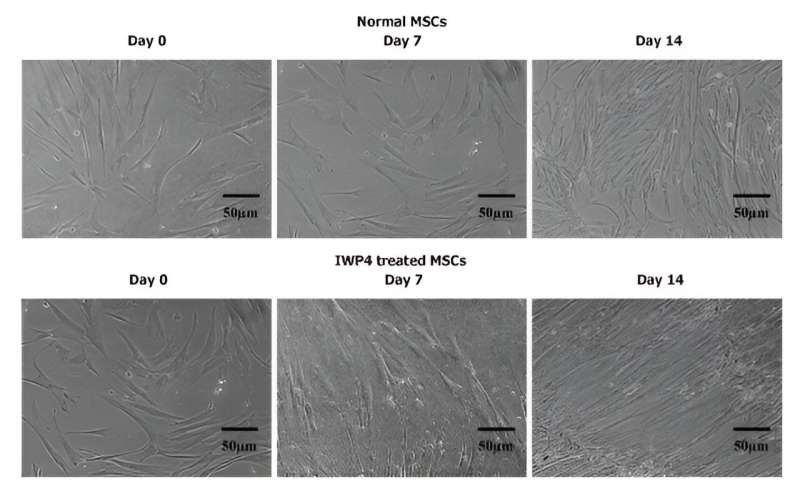This article has been reviewed according to Science X's editorial process and policies. Editors have highlighted the following attributes while ensuring the content's credibility:
fact-checked
proofread
Study: Wnt signaling pathway inhibitor promotes mesenchymal stem cell differentiation into cardiac progenitor cells

Cardiovascular diseases, particularly myocardial infarction (MI), are the leading cause of mortality and morbidity around the globe. Because cardiac tissue possesses very limited regeneration potential, use of a potent small molecule, inhibitor Wnt production-4 (IWP-4) for stem cell differentiation into cardiomyocytes could be a promising approach for cardiac regeneration.
Wnt pathway inhibitors may help stem cells in their fate determination toward cardiomyogenic lineage and provide better homing and survival of cells in vivo. Mesenchymal stem cells (MSCs) derived from the human umbilical cord have the potential to regenerate cardiac tissue, as they are easy to isolate and possess multilineage differentiation capability. IWP-4 may promote the differentiation of MSCs into the cardiac lineage.
For this study, published in World Journal of Stem Cells, umbilical cord tissue of human origin was utilized to isolate the MSCs, which were characterized by their morphology, immunophenotyping of surface markers specific to MSCs, as well as by tri-lineage differentiation capability. Cytotoxicity analysis was performed to identify the optimal concentration of IWP-4. MSCs were treated with 5 μM IWP-4 at two different time intervals. Differentiation of MSCs into cardiomyocytes was evaluated at DNA and protein levels.
The MI rat model was developed, and IWP-4 treated as well as untreated MSCs were implanted in the MI model. Then the cardiac function was analyzed via echocardiography. MSCs were labeled with 1,1′-dioctadecyl-3,3,3′,3′-tetramethylindocarbocyanine perchlorate (DiI) dye for tracking, while the regeneration of infarcted myocardium was examined by histology and immunohistochemistry.
MSCs were isolated and characterized. Cytotoxicity analysis showed that IWP-4 was non-cytotoxic at 5 μM concentration. Cardiac specific gene and protein expression analyses exhibited more remarkable results in 14 days in the treated group that was eventually selected for in vivo transplantation. Cardiac function was restored in the IWP-4 treated group in comparison to the MI group. Immunohistochemical analysis confirmed the homing of pre-differentiated MSCs that were labeled with DiI cell labeling dye. Histological analysis confirmed the significant reduction in fibrotic area, and improved left ventricular wall thickness in IWP-4 treated MSC group.
Treatment of MSCs with IWP-4 inhibits Wnt pathway and promotes cardiac differentiation. These pre-conditioned MSCs transplanted in vivo improved cardiac function by cell homing, survival, and differentiation at the infarcted region, increased left ventricular wall thickness, and reduced infarct size.
This study highlights the role of Wnt signaling pathway in the differentiation of mesenchymal stem cells (MSCs) into cardiac progenitor cells and the therapeutic potential of MSCs conditioned with inhibitor Wnt production-4 (IWP-4) for the treatment of heart disease. Further studies are required to comprehend the mode of action of IWP-4 on MSCs and to assess its potency and safety in human clinical trials. Nevertheless, this research is an exciting step forward for new treatments for heart diseases and is more focused on the importance of continued investment in the development of innovative therapies for this devastating condition.
More information: Rabbia Muneer et al, Wnt signaling pathway inhibitor promotes mesenchymal stem cells differentiation into cardiac progenitor cells in vitro and improves cardiomyopathy in vivo, World Journal of Stem Cells (2023). DOI: 10.4252/wjsc.v15.i8.821
Provided by World Journal of Stem Cells





















